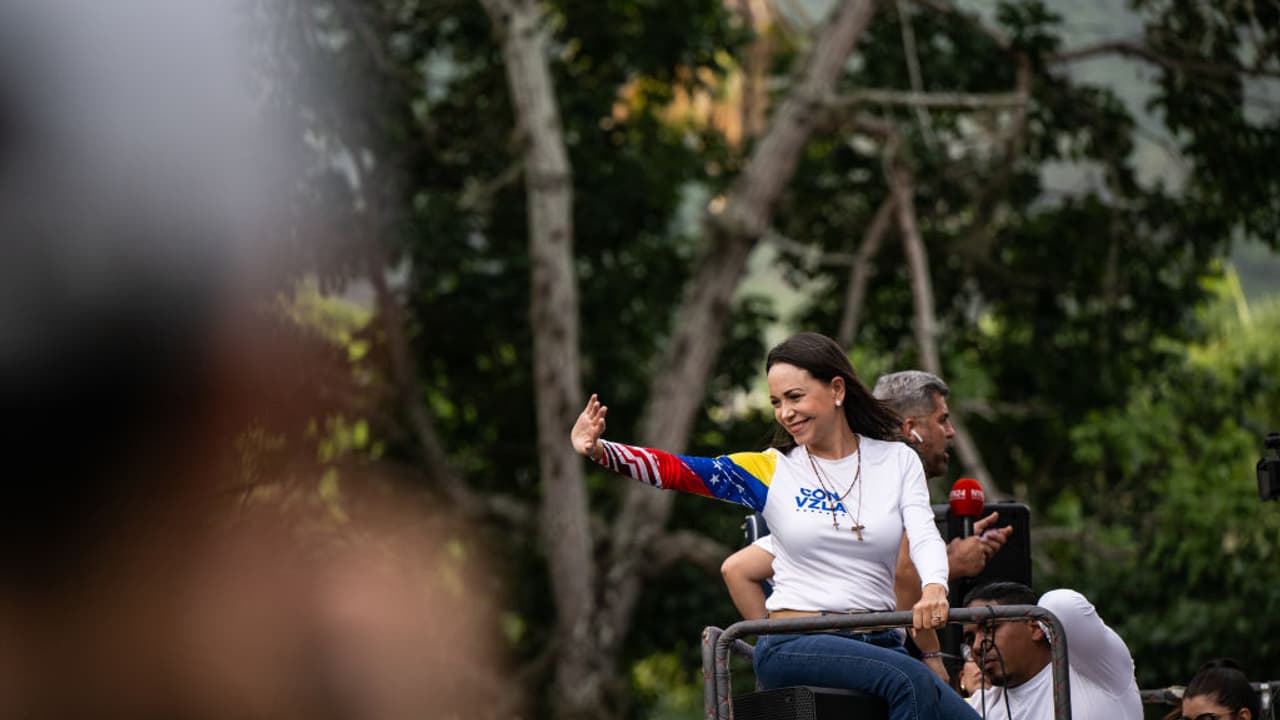The Norwegian Nobel Committee committee avoided controversy by awarding Maria Corina Machado instead of Donald Trump, who has disputed diplomatic achievements and poor international ratings.
Bengaluru: The Norwegian Nobel Committee has dodged a bullet by awarding the 2025 Nobel Peace Prize to Maria Corina Machado, a democracy activist from Venezuela often hailed for her defiance and continued pressure against the government. In doing so, the committee sidestepped months of speculation that US President Donald Trump might receive the honor for what he described as his “historic diplomatic accomplishments.” Instead, it chose a figure whose global image blends courage, controversy, and unmistakable political theater. But in many ways, Machado and Trump have more in common than either might care to admit.
Machado has become the uncompromising face of opposition to Nicolas Maduro, defying government bans to run for president and rallying public support in the streets. Her platform aligns closely with Washington’s foreign policy goals in Venezuela: she embraces US sanctions, has hinted at humanitarian interventions, and relies on international support to challenge Maduro’s authoritarian grip. For Trump, whose administration deployed warships, F-35 jets, and nuclear-powered submarines near Venezuela to combat drug cartels and pressure Maduro, Machado represents a political figure whose actions validate his own hardline approach. She demonstrates that internal opposition combined with international leverage can effectively challenge regimes Trump has publicly opposed.
The US has repeatedly accused Maduro of running the Cartel de los Soles, justifying targeted strikes on suspected drug boats, operations that killed at least 14 people and drew international criticism. In Caracas, Maduro interprets these strikes as a threat of invasion, while Trump framed them as law enforcement measures against “terrorists” trafficking narcotics to the United States. Machado’s alignment with sanctions and international pressure mirrors Trump’s own strategy: confronting a leader deemed a regional threat while presenting the operation as defending national and global security.
Moreover, Machado’s Nobel Prize sends a message to Latin American leaders that resistance to socialist regimes can garner global legitimacy and recognition, something Trump himself has long sought through international awards and symbolic victories. By elevating Machado, the Nobel Committee indirectly endorses a policy approach Trump championed – using US influence abroad to weaken authoritarian governments while presenting the intervention as moral, strategic, and peace-oriented.
Why Choosing Trump Could Have Sparked Controversy
The Trump administration’s assertion that the US President deserved a Nobel Peace Prize for his role as “peacemaker-in-chief” had generated significant debate. The conflicts Trump claims to have ended were often brief, lasting just days, and emerged from long-standing tensions rather than representing new wars. In the Israel-Iran conflict, Trump posted on 23 June that both countries would start a ceasefire, officially ending “THE 12 DAY WAR”. However, after the hostilities ended, Iran’s Supreme Leader Ayatollah Ali Khamenei insisted his country had secured a “decisive victory” and did not mention a ceasefire. Additionally, Israel has since suggested it could strike Iran again to counter new threats. Regarding Rwanda and the Democratic Republic of Congo, in June, the two countries signed a peace agreement in Washington. However, since the latest deal, both sides have accused each other of violating the ceasefire, and in July, the M23 rebel group killed at least 140 people, including women and children. In the Egypt-Ethiopia situation, no formal deal has been reached between the two countries to resolve their differences. India categorically denied any role of the US in ending the conflict with Pakistan, even when the latter championed Trump for the Nobel Peace Prize.
Even if one gives credit to Trump for ending these conflicts, the Russia-Ukraine war remains the clearest test of his self-proclaimed peacemaking prowess. Volodymyr Zelenskyy was ready to nominate Trump if he helped secure a ceasefire with Moscow. Trump has repeatedly claimed that he could have “ended the war in 24 hours,” there is no evidence that his administration brokered or even proposed a concrete peace framework acceptable to both sides.
A Pew Research Center survey conducted from January 8 to April 26, 2025, across 24 countries provides data on international perceptions. President Donald Trump receives mostly negative ratings, with more than half in 19 of these countries saying they lack confidence in Trump’s leadership of world affairs. Overall ratings of the United States have declined in 15 nations since last spring, including drops of 20 percentage points or more in Mexico, Sweden, Poland and Canada. When evaluating Trump’s personal characteristics, a median of 80% across the 24 nations say the term “arrogant” describes him. About two-thirds of people say that “dangerous” describes Trump and that “honest” does not.
All of these indicate that it was best for the Nobel Committee to not upset global opinion by awarding the prize to Donald Trump. By choosing María Corina Machado instead, the committee sidestepped the risk of inflaming geopolitical tensions or undermining the credibility of the prize. Machado’s recognition highlights her courageous stand against authoritarianism in Venezuela, aligns with broader international calls for democratic governance, and allows the Nobel Committee to maintain its focus on activism and moral courage.
